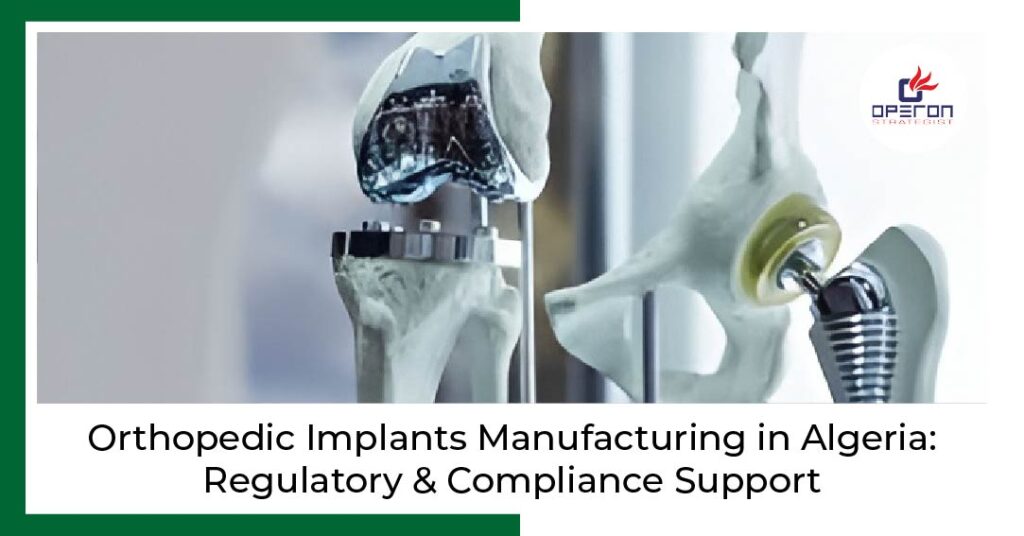Overview of Orthopedic Implants Manufacturing in Algeria
As Algeria invests in expanding its healthcare sector, orthopedic implants manufacturing is emerging as a crucial area of growth. With increasing demand for advanced healthcare solutions, government initiatives promoting local production, and advancements in biomedical technology, Algeria is positioned to strengthen its healthcare infrastructure through domestic orthopedic device manufacturing.
This article outlines the market opportunity, regulatory framework, and how Operon Strategist supports manufacturers in establishing compliant and efficient orthopedic implant production facilities in Algeria.
Looking For a Medical Device Regulatory Consultant?
Why Orthopedic Implants Are Essential in Algeria
Orthopedic implants play a vital role in restoring mobility, relieving pain, and improving the quality of life for patients with bone, joint, and spine disorders. In Algeria, several factors are driving the need for these medical devices:
✔ Aging population – Joint degeneration and fractures requiring hip and knee replacements are rising.
✔ Lifestyle diseases – Obesity and diabetes contribute to bone and joint problems.
✔ Road traffic accidents – Trauma surgeries involving plates, screws, and spinal implants are increasingly needed.
✔ Healthcare infrastructure growth – Expansion of hospitals and surgery centers in urban and rural areas is improving access to advanced care.
This demand underscores the importance of building a robust local orthopedic implant industry to ensure timely access to high-quality medical devices.
Types of Orthopedic Implants Manufactured in Algeria
Manufacturers are focusing on a wide range of implantable devices, including:
- Trauma Implants – Plates, screws, and intramedullary nails used for fracture fixation.
- Joint Replacement Implants – Hip, knee, and shoulder prostheses for degenerative joint diseases.
- Spinal Implants – Rods, cages, and pedicle screws for spine stabilization.
- Dental & Maxillofacial Implants – Used in restorative and reconstructive procedures.
Local production allows customization, faster delivery, and cost optimization while leveraging modern technologies like 3D printing and computer-aided design (CAD/CAM).
Regulatory Framework for Orthopedic Implants in Algeria
Orthopedic implants are classified as high-risk medical devices and must meet stringent safety and quality standards before being used in clinical settings.
Key Regulatory Requirements:
- Medical Device Registration:
All orthopedic implants must be registered with the Algerian health authorities. The process includes submission of technical documentation, clinical evidence, and manufacturing details. - Device Classification:
Implants are considered high-risk (Class III or IV equivalent), requiring comprehensive risk assessment and performance data. - Technical File & Risk Management:
Manufacturers must submit a technical file prepared according to ISO 14971, which includes risk analysis, clinical evaluation, and safety validation. - ISO 13485 Certification:
A quality management system aligned with ISO 13485 is mandatory. It covers process validation, traceability, design controls, and post-market surveillance. - Good Manufacturing Practices (GMP):
Production facilities must meet GMP guidelines to ensure sterile environments, equipment maintenance, and validated processes. - Unique Device Identification (UDI) & Monitoring:
Implants must be traceable through UDI systems and monitored for safety once they are available in the market.
Benefits of Local Orthopedic Implants Manufacturing
| Benefit | Description |
|---|---|
| Faster Delivery | Local manufacturing reduces delays from imports and ensures quicker access to life-saving devices. |
| Cost Savings | Lower shipping, customs, and logistics costs make healthcare more affordable. |
| Patient-Specific Implants | Customized implants using advanced technologies lead to better patient outcomes. |
| Job Creation | Skilled jobs in biomedical engineering and healthcare manufacturing boost the economy. |
| Healthcare Independence | Reducing reliance on imports strengthens national healthcare resilience. |
Challenges and Opportunities
Common Challenges
✔ High initial capital investment for sterile production facilities
✔ Limited access to trained professionals and experts in medical device manufacturing
✔ Complex regulatory processes requiring thorough documentation and audits
Opportunities
✔ Government incentives for local production and healthcare infrastructure
✔ Collaborations with global experts and technology providers
✔ Access to funding and development programs for innovation and research
Ready to Build Orthopedic Implant Manufacturing in Algeria?
How Operon Strategist Supports Orthopedic Implant Manufacturers in Algeria
Operon Strategist is a global consultancy specializing in medical device regulation, quality management, and manufacturing compliance. Our expertise helps manufacturers overcome challenges and accelerate market entry.
Our Support Services:
- Regulatory Compliance & Registration:
We assist with preparing and submitting registration dossiers, clinical evaluations, and risk management files in line with Algerian requirements. - GMP-Compliant Facility Design:
Our experts guide you in designing cleanrooms, validating equipment, and implementing process controls for sterile implant manufacturing. - ISO 13485 Implementation:
We help establish and maintain a compliant quality management system covering every stage of production. - Training & Audit Readiness:
We provide training programs to equip your teams with the knowledge needed to maintain regulatory compliance and handle audits confidently. - Product Development Consulting:
We advise on materials selection, biocompatibility testing, and manufacturing processes to ensure safety, performance, and innovation.
Download Free PDF: Orthopedic Implants Manufacturing & Compliance in Algeria
FAQs
What are the regulatory requirements for orthopedic implants in Algeria?
Orthopedic implants in Algeria are classified as high-risk medical devices. To gain approval, manufacturers must register their products with the Ministry of Health, submit a technical file, provide clinical data, and ensure compliance with international standards such as ISO 13485 for quality management and ISO 14971 for risk management. Facilities must also meet GMP (Good Manufacturing Practice) requirements for sterile production.
Why should companies invest in orthopedic implant manufacturing in Algeria?
Algeria’s growing healthcare sector, government incentives for local medical device production, and rising demand for trauma, joint replacement, and spinal implants make it an attractive market. Local manufacturing reduces dependency on imports, cuts costs, ensures faster delivery, and supports customization of implants using advanced technologies like CAD/CAM and 3D printing.
How can foreign medical device companies enter the Algerian market?
Foreign manufacturers can enter Algeria’s orthopedic implants market by setting up local production units, collaborating with Algerian partners, or working with a medical device regulatory consultant in Algeria to ensure smooth registration, compliance, and certification processes. Partnering with experts helps reduce risks, ensures quicker approvals, and improves market entry success.
